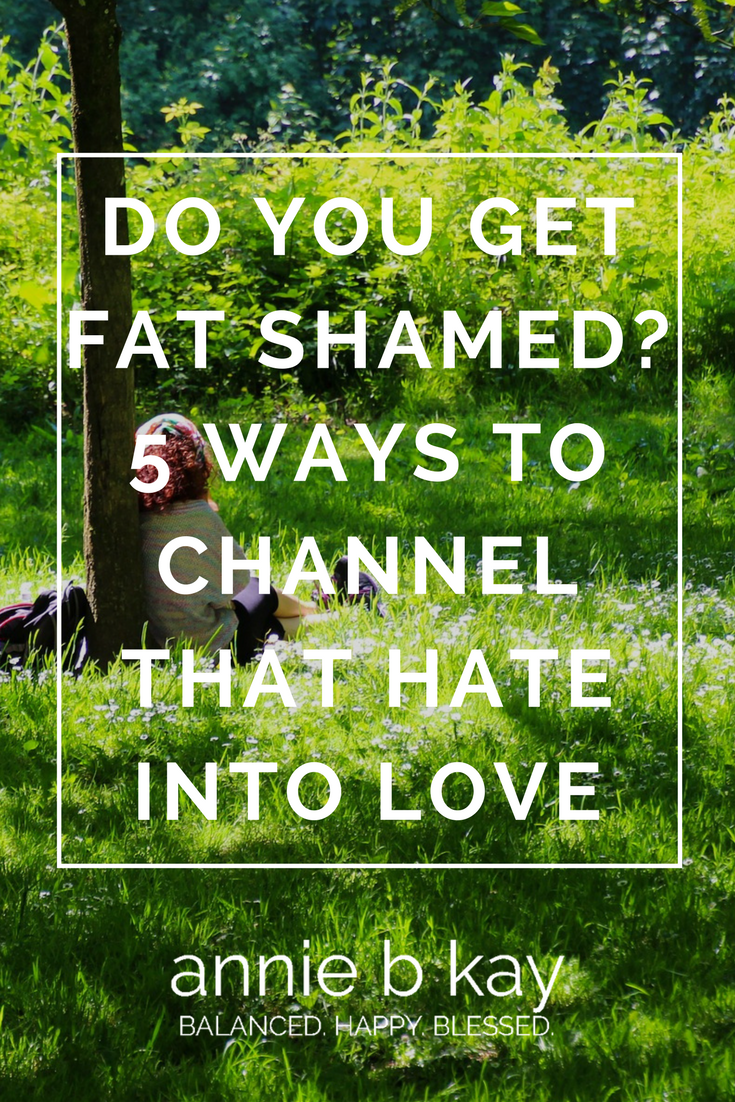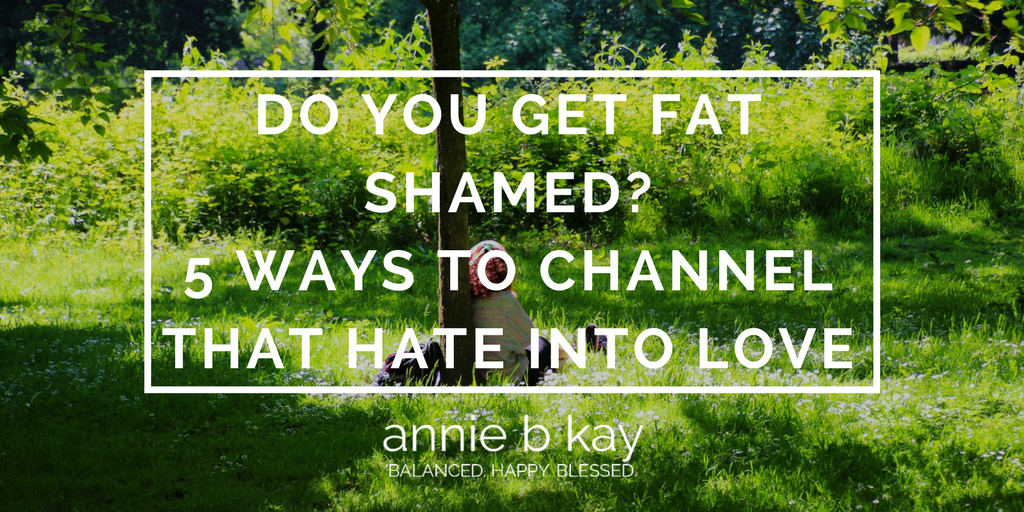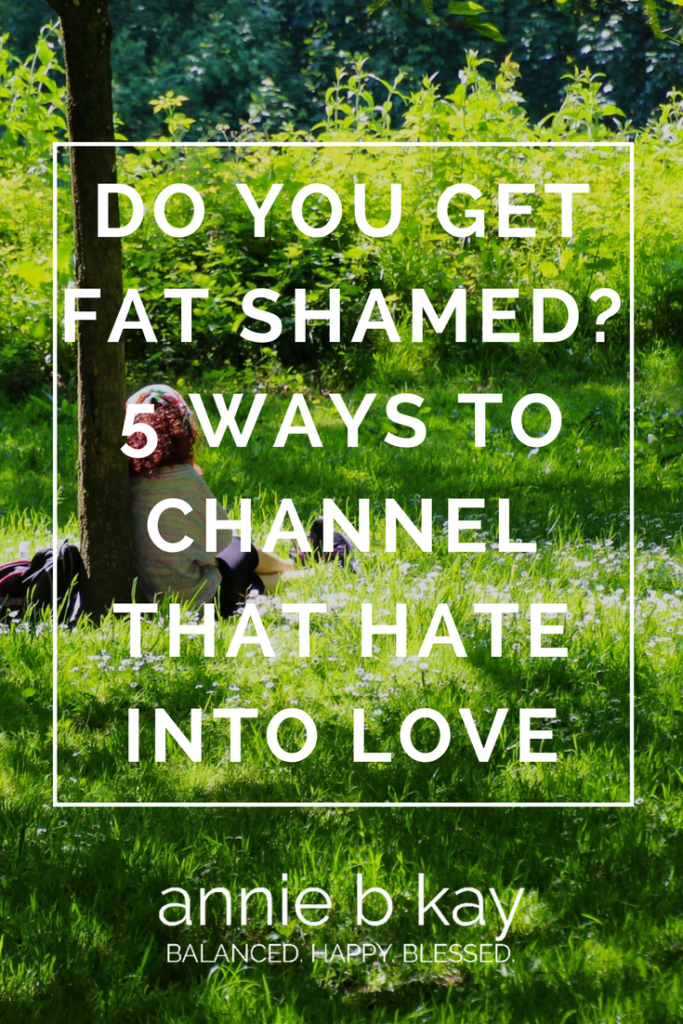
Do You Get Fat Shamed? 5 Ways to Channel That Hate into Love

Donald is gaining weight. He’s feeling the stress! But I am saddened by some of my favorite commentators’ abusive language around his stress eating and resulting weight.
Several years ago at a nutrition conference, I took a test designed by researchers at the Rudd Center for Food Policy at Yale, that consisted of quickly circling a series of characteristics which may or may not describe an overweight person.
Here we were, a roomful of dietitians who’s professional lives are dedicated to helping those who struggle with weight and eating, and when the results came in, we were shown to be rife with our own weight bias. The speaker shared that her experience with health professionals across the country suggested that all of us – down to a person – carry a deep bias against people of size.
I feel it myself. Working in yoga, which has, overall, become a youth-oriented, thin-oriented world isn’t always easy. There are times my brilliance doesn’t matter – how can that be?!
We are a nation terrified of gaining weight and intolerant of those who do. Social stigmatization of overweight people is at an all-time high. All the while it seems more difficult to achieve a healthy weight, and Americans continue to gain. We are hard on each other, and hard on ourselves, and none of it is helpful.
This mass aversion to weight appears to be based less in science than fashion (and fear). Body weight, scientists are finding, does not predict health as well as healthy lifestyles and physical fitness do. More Americans are fit and fat, and thinness does not guarantee good health.
Obesity is being blamed for everything from higher gas prices to global warming. The latest round of zealous investigation of the costs of obesity is an article in the current issue of The Engineering Economist, which calculates how much more gasoline is used by overweight Americans. The findings are in the same vein as an article by the Centers for Disease Control and Prevention last year, that calculated how much more fuel airlines use now that the American waistline has expanded.
“People are out scouring the landscape for things that make obese people look bad,” noted Kelly Brownell, a director of the Rudd Center for Food Policy at Yale in a recent New York Times article. Is that a bad thing? Opinions are decidedly mixed. Some educators feel that anything that can be done to motivate people to eat less and exercise more should be done, including social ridicule.
Does this public flogging work? Research suggests that for weight issues, it does not.
Unlike other public health issues – smoking, substance abuse, peer pressure around obesity seems to make the problem worse. Several recent studies reported in Obesity Research suggest that the stigma of overweight and its emotional fallout leads those who struggle with eating and weight to eat more, not less.
Why might this be so? For smoking, drinking and other unhealthy habits, abstinence is a viable and sometimes preferable choice. But we need to eat to live, so with food abstinence is not an option. To eat consciously we must learn to be moderate. And moderation is not a widely observed American trait.
Eating is a sensual experience, with its emotional roots deep in our earliest memories. From our first nursing at our mother’s breast (or from the bottle offered by dad), eating is what humans do when we come together, be it family dinner or special celebrations. Food is not only the fuel that enables our survival; it represents connection, comfort, even love. No wonder, when our lives feel out of balance, our relationship with food also becomes unbalanced. Eating is comforting, at least in the short term. Over time, however, overeating as a coping mechanism never works and becomes just another stress-producing part of life.
Our deep connection with food and eating is brilliantly exploited in advertising, with large portions of snack foods offered up as a salve for what ails us. Studies have shown that food in advertising is also presented as means to relieve loneliness, replace relationships, reward ourselves, and manage stress. At the same time, the media suggests we keep the medicinal chocolate cake handy, it also peddles images of beauty that are impossibly thin.
What can we do to escape the cycle of eating and intolerance? How do we turn the hate into self-love and forgive the haters?
- We can relax. By occasionally unplugging from the constant contact, always available, 24/7 culture, we can begin to unwind. By slowing down we just say no to the media-driven messages of disordered eating and unhealthy body image. As we do that, a quiet whisper of truth can finally be heard, and more natural ways of being can emerge.
- We can learn to feel our emotions fully before reacting. This is a great practice – feel, honor, release emotions without pacifying or burying how we feel with distractions of food or shopping. Just taking a brief walk can be a great way to manage stress, to think, to breath, and to elucidate and integrate how you feel about something.
- We can try this simple (but not easy) process when we feel the red flag of intolerance toward ourselves or others: Slow down. Breathe. Relax. Send loving kindness to whoever triggered your red flag. The Dalai Lama says that when someone triggers you – really pushes your buttons, we should bow down and thank them. I love Buddhist humor! So hard to do – but so necessary to make the world a better place.
- We can practice compassionate self-observation free of judgment. What are the parts of your body that you feel are most beautiful? Can you let those good feeling expand – like a golden light – to your whole body? How about your life – what is going well?
- We can try less. Try less of anything we approach with a consuming mindset, be it food, busyness, money, or exercise. Don’t believe the lie that you have to do everything or be perfect.
Each of these simple (though not easy) practices cultivates conscious renunciation of the crazy culture we live in. They are a simple (but not easy) means of taking control of your own life experience.
Part of the job of being me is to practice and model. To show up, even when it’s hard and I’d rather not. I believe very very deeply that it’s the oldest, largest, most handicapped person in the yoga class who is the biggest teacher – who sends the message to every young woman and man that yes, it’s OK to get older or larger or less well or lose a leg (like one wonderful woman who, when there was a deep community connection, came to classes regularly).
We all need to live in the world. And our world is a bountiful place where anything is possible. Fashion, the media, and all the gizmos of modern life can be fun tools for creating a productive and meaningful existence. There is nothing inherently evil about our culture except that parts of it are designed to make us feel horrible about ourselves as a strategy to keep us shopping and eating.
The obesity epidemic is a global health crisis. And it may be that our growing waistlines contribute to global warming, high gas prices, and other societal ills. Let’s forgive the researchers who spent their time, talent, and our money to make these calculations.
Ooaaahhhmmm. Namaste.



